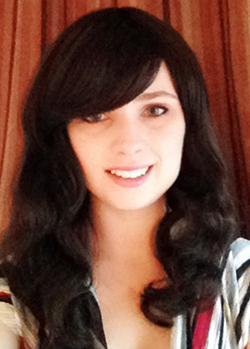 Brieanna received $350 from FFRF for her essay.
Brieanna received $350 from FFRF for her essay.
Why don’t I believe in God? It’s for the same reasons I don’t believe in unicorns or subterranean fairy folk. Perhaps God isn’t even the right term; maybe gods would be more apt.
It would be a waste of time and words to prattle on about the lack of evidence, inconsistency and sometimes outright lunacy expressed in whisper-thin pages. The highlighted text and fluorescent sticky notes in my little purple bible would be more than enough to fill another, but that’s been done before by people far more skilled than I.
That makes the affront impersonal and impartial, dissecting it like a thesis, but for so many, the offense is personal.
I cannot remember when I lost my faith, or if I ever had any to begin with. I remember big white steeples with stained glass and kind-faced pastors, but I do not remember God. Sunday school was Oreos and hot chocolate and no different from the other fairy tales collected on my small bookshelf. This was by no means an overwhelmingly oppressive environment, and I never felt like I couldn’t talk about my disbelief when I felt the need, but then again I’m not the type to hold my tongue anyway.
Nevertheless, I’m still absolutely terrified to the point of tears on occasion. No, I’m not afraid of God or hell, I’m afraid of what it makes of the people I love.
On Nov. 11, 2010, my family got a late-night visit from an officer. My older brother had been killed in a car crash. He was drinking with a friend and not wearing his seat belt. Death is a struggle in any form, and the first question is always “why”?
With a faith in God, the answer is usually something along the lines of “it was his time” and “God must have needed another angel.” This was not the answer for me, and from my perspective, gave my brother’s death even less meaning than it had to begin with. I understood that people die, whether by accident or with purpose. I knew my brother could have lived.
Seat belts save lives and alcohol doesn’t make you invincible, contrary to popular belief. But I watched as religion tore at my family and tainted my brother’s death with purposelessness. If we can only wallow in sadness and provide flimsy reasons for death, how can we ever hope to defeat it? If we cannot point at a cause of suffering and tell ourselves we are responsible for fixing it, not just watching it happen, how do we ever hope to see its end?
Voltaire’s Candide asserts that regardless of the existence of God, we must “cultivate our own garden.” For what concern does a pharaoh have for the rats that struggle in the water at the bottom of his boat? None, they must find their own way to survive the plights put upon them.
Regardless of God’s existence, human suffering is not about to end on his account or authority, so that leaves only us to solve our own hardship.
This comes to my second fear, what religion does to the world I hope to see rise around me. A space race we once approached with gusto has given in to apathy. I see the most powerful men and women of our nation bound up in petty squabbles over gay marriage, and they can’t be bothered to care about the world we can create because they’re too busy trying to preserve the one we have.
It scares the daylights out of me that perhaps 70% of the people of this nation and their representatives believe we will see the end of humanity. They think it’s something to welcome because they can’t fathom actually coexisting with people who think differently from themselves. They envision a white-robed savior smiting evil and condemning over half the world’s population to eternal torture.
I cannot comprehend how I’m the immoral one. I’ve been called inhuman, empty and psychopathic because of my nonbelief, but the thought that so many could envision the suffering of those around them and not feel the urge to revolt against that fate is what I find disheartening.
I cannot imagine what it must be like to look upon the Earth and humanity and not see the possibilities we possess. What I hope are eventualities — human colonization, interstellar travel, extraterrestrial communication and perhaps Starfleet command — are not even considerations to such short-sighted, narrow-minded, unimaginative people. If you cannot imagine the future, how could you possibly hope to make it happen?
If all you can see within humanity is its faults and feel they are insurmountable obstacles, you regulate humans to an existence of finite potential, because to strive for better would seem pointless and challenge what God has in mind. Religion will always put humanity in second place, because we are not worshipping our own abilities and achievements, but putting what we cannot do into a little box of divinity and never opening it again.
We can be our own masters, but with the responsibility of our successes also comes that of our failures, and that scares us.
Brieanna Kringlie, 18, Newcastle, Wyo., is a sophomore majoring in graphic design at the University of Wyoming and is considering minoring in Japanese.

